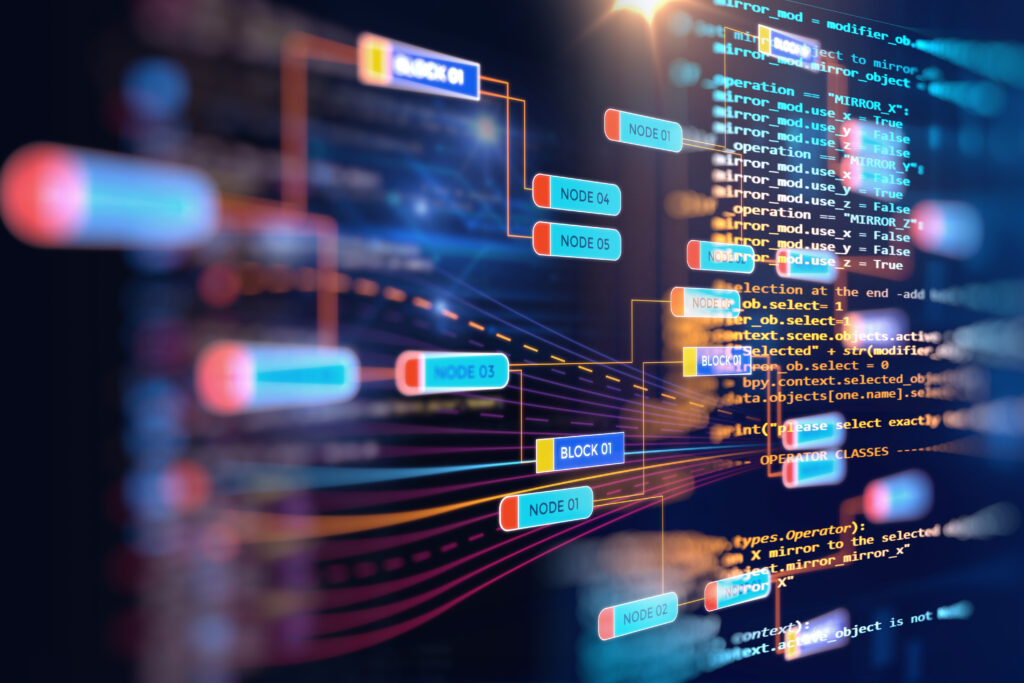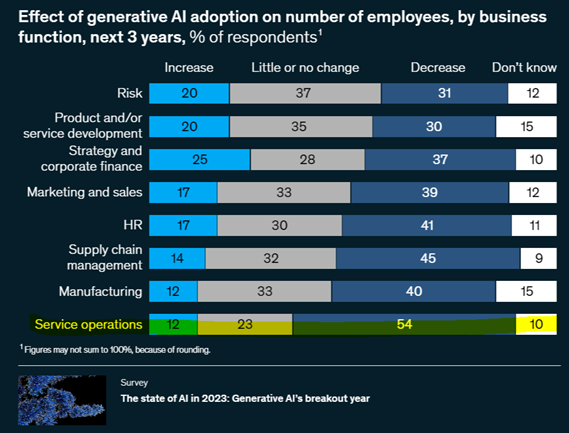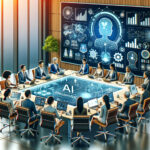Why it Matters: Shared services centralize business functions to reduce costs and increase efficiency. Generative AI will significantly change shared service operations, further adding to the shared service value for companies.
- What are concrete examples where Generative AI can improve shared services operations?
- HR Shared Services and Generative AI
- Finance Shared Services and Generative AI
- Procurement Shared Services and Generative AI
- Shared Services IT and Generative AI
- Shared Services Level 1 and 2 Support and Generative AI
- Shared Services Data Collection and Preparation and Generative AI
- Shared Services Operational Stability and Scalability and Generative AI
- Shared Services Innovation and Service Development and Generative AI
- Shared Services Contract Management and Generative AI
- Shared Services Service Management and Generative AI

The Big Picture
- Definition: Shared services refer to the consolidation of business operations used by multiple parts of the same organization.
- Objective: Their primary aim is to enable resource sharing to improve service delivery, cut costs, and enhance operational efficiency.
- Common Areas: These often include human resources, IT, finance, procurement and customer service.
- Implementation: Businesses implement shared services by creating centralized units or centers of excellence.
- Benefits: Shared services lead to standardized processes, reduced duplication, and economies of scale.
- Challenges: Key challenges include managing change, ensuring service quality, and aligning with diverse business unit needs.
By the Numbers
- Cost Reduction: Organizations can achieve up to 30-40% cost savings in operational costs through shared services.
- Adoption Rate: About 80% of Fortune 500 companies use some form of shared services.
- Efficiency Improvement: Shared services can improve process efficiency by 25-30%.
More Details
Shared services are a strategic model where business operations commonly used by multiple departments or divisions are centralized. This centralization allows for more efficient and cost-effective service delivery.
- Evolution: Initially, shared services were mainly for back-office functions like HR and finance. Now, they’re expanding into more strategic areas like procurement and marketing.
- Technology’s Role: Advancements in technology, particularly in AI and automation, are significant drivers in the effectiveness of shared services. Automation reduces manual tasks, leading to higher efficiency.
- Global Trend: Many large organizations establish shared service centers in different geographical locations to leverage talent and cost advantages.
- Performance Measurement: Shared services are often evaluated based on cost savings, service quality, and customer satisfaction.
- Customization vs. Standardization: Balancing the need for standardized processes with the unique needs of different business units is a constant challenge in shared services.
Further reading
McKinsey Future of Work article predicts a significant change in shared services )Effect of generative AI adoption on number of employees, by business function, next 3 years, % of respondents)

What are concrete examples where Generative AI can improve shared services operations?
HR Shared Services and Generative AI

HR Shared Services: Enhancing and streamlining HR support, automating routine tasks, streamlining employee onboarding, providing accurate responses to employee inquiries, improving accuracy and consistency of employee data management, reducing calls to the HR center, and monitoring compliance.
- AI-Powered Chatbots for Employee Inquiries: Implementing AI chatbots can provide immediate, accurate responses to common employee queries regarding company policies, benefits, leave, and other HR-related matters. This reduces the workload on HR staff and improves employee satisfaction with quicker resolutions.
- Onboarding Automation: GenAI can facilitate employee onboarding by automating the creation and distribution of onboarding materials, scheduling introductory meetings, and guiding new hires through company policies and procedures. This makes the onboarding process smoother and more engaging for new employees.
- Personalized Employee Development Plans: AI algorithms can analyze an employee’s performance, skills, and career aspirations to create personalized development plans. This includes recommending specific courses, training programs, or assignments to aid in their career progression.
Finance Shared Services and Generative AI

Financial Shared Services: Enabling areas such as variance analysis, synthesis of financial statements, real-time commentary on financial conditions, automating data-intensive tasks, enhancing the quality of financial analyses, enabling seamless delivery of actionable insights to leadership, and evolving to provide more value-added services like financial statement analysis and first-pass commentary generation.
- Variance Analysis: GenAI can automate the process of variance analysis by comparing actual financial performance against budgeted or forecasted figures. AI algorithms can quickly identify and highlight significant variances, providing detailed insights into the reasons behind these discrepancies, which helps in more efficient financial planning and control.
- Enhancing the Quality of Financial Analyses: AI can analyze vast amounts of financial data to identify trends, risks, and opportunities that might not be evident through traditional analysis methods. This leads to more comprehensive and insightful financial analyses.
- Financial Statement Analysis and First-Pass Commentary Generation: AI can perform initial analyses of financial statements, providing first-pass commentary on key financial metrics such as liquidity ratios, profitability, and solvency. This initial analysis can guide more in-depth reviews by financial experts.
Procurement Shared Services and Generative AI
Procurement: Improving transactional efficiency, drafting requests for supplier proposals, evaluating supplier proposals, supporting negotiation strategy development, conducting negotiations autonomously, and enabling compliant execution of transactions against contracts.
- Drafting Requests for Supplier Proposals (RFPs): AI can assist in drafting comprehensive and clear RFPs by analyzing previous successful proposals and incorporating key elements. It can ensure that all necessary specifications and compliance requirements are included, making the RFP process more efficient.
- Supplier Risk Management: AI can continuously monitor and evaluate supplier performance and risk factors, such as financial stability, compliance history, and delivery performance. This helps in proactive supplier management and risk mitigation.
- Supporting Negotiation Strategy Development: AI algorithms can analyze past negotiation outcomes, market trends, and supplier data to recommend effective negotiation strategies. This can include advising on optimal pricing, contract terms, and negotiation tactics.
Shared Services IT and Generative AI

IT/Technology: Assisting developers and software testers, generating code, reviewing existing code, generating automation testing scripts, providing quicker and more efficient support during operations and maintenance phases, automating tasks like ticket triaging and knowledge retrieval, and improving organizational resilience to outages.
- Assisting Developers with Code Suggestions: GenAI can suggest code snippets and solutions to developers in real-time, helping them write more efficient and error-free code. This can significantly speed up the development process and reduce the learning curve for new programming languages or frameworks.
- Automated Code Review: AI algorithms can review existing code for potential errors, performance issues, or deviations from best practices. This helps in maintaining high code quality and standards, and also in identifying areas for optimization.
- Generating Automation Testing Scripts: GenAI can automatically generate testing scripts based on the application’s requirements and user stories. This not only speeds up the testing process but also ensures comprehensive test coverage, leading to more robust software.
- Automating Ticket Triaging: AI can be used to automatically categorize and prioritize support tickets based on their urgency and complexity. This ensures that critical issues are addressed promptly and improves the overall efficiency of the support process.
- Knowledge Retrieval and Management: GenAI can help in organizing and retrieving knowledge from various documentation sources, making it easier for developers and testers to find relevant information quickly. This is particularly useful in large projects with extensive documentation.
Shared Services Level 1 and 2 Support and Generative AI

L1/L2 Support: Enhancing user experience through natural language processing advancements, dynamically personalizing interactions with users, and making self-service feel more like full service.
- Personalized Customer Service Chatbots: AI-powered chatbots can interact with users in a natural, conversational manner. These chatbots can understand user queries and provide accurate, relevant responses, making the self-service experience more efficient and user-friendly. They can also remember past interactions to provide a more personalized service over time.
- Interactive Educational Tools: GenAI can be used to create personalized learning experiences, where the content, difficulty level, and learning pace are tailored to each student’s needs and learning style, making education more engaging and effective.
- Real-time Language Translation: AI-powered translation services can provide real-time, context-aware translations in various applications, breaking down language barriers and enhancing global support, especially for the plant-based employees.
Shared Services Data Collection and Preparation and Generative AI
Data Collection and Preparation: Automating procedures for data collection and preparation, thereby increasing efficiency and reducing manual labor.
- Automated Data Extraction from Documents: GenAI can be used to automatically extract relevant data from various types of documents, such as invoices, contracts, and forms. This can significantly reduce the time and effort required for manual data entry and increase the accuracy of data captured.
- Data Standardization and Cleansing: AI algorithms can standardize data from different sources to a common format and cleanse it by removing duplicates, correcting errors, and filling in missing values. This ensures high-quality, consistent data, which is crucial for accurate analysis and reporting.
- Integration of Disparate Data Sources: GenAI can automate the integration of data from various sources, such as ERP systems, CRM platforms, and external databases. This allows for a more seamless aggregation of data, which is essential for comprehensive analysis and decision-making.
Shared Services Operational Stability and Scalability and Generative AI

Operational Stability and Scalability: Leveraging generative AI in IT processes to scale and accelerate delivery models, improve operational stability, and reduce response times and costs.
- Enhanced Bug Detection and Code Review: AI algorithms can analyze code to detect bugs and vulnerabilities more efficiently than manual processes. This not only improves the quality of the software but also accelerates the development cycle.
- Optimization of Software Testing and QA Processes: GenAI can automate various aspects of software testing, including the generation of test cases, identification of testing gaps, and providing insights for quality improvement.
- Intelligent Incident Management and Response: GenAI can be used for intelligent incident management, including the automatic categorization, prioritization, and even initial troubleshooting of incidents, thereby enhancing response efficiency and reducing resolution times.
Shared Services Innovation and Service Development and Generative AI
Innovation and Service Development: Generating ideas, content, and prototypes much faster, enabling quicker innovation and development of new services.
- Idea Generation for New Services: GenAI can be used to rapidly generate a wide range of innovative ideas for new services based on market trends, customer feedback, and competitive analysis. This helps in identifying potential areas for service development that might not be immediately apparent through traditional brainstorming methods.
- Automated Content Creation for Marketing and Communication: AI can create diverse forms of content, including text, images, and videos, for marketing new shared services. This can significantly speed up the content creation process and provide a variety of creative outputs to choose from.
- Enhancing User Experience Design: AI can analyze user behavior and preferences to suggest improvements in user interface and user experience design, ensuring that new services are intuitive and user-friendly.
Shared Services Contract Management and Generative AI

Contract Management: Ingestion of contracts, extraction of terms and clause details, and enabling compliant execution of transactions against contracts.
- Automated Contract Ingestion: GenAI can automate the ingestion of contracts into management systems. It can scan, read, and digitize paper-based contracts or import digital contracts, making them readily accessible for further processing.
- Extraction of Terms and Clauses: AI algorithms can efficiently extract specific terms and clauses from contracts. This includes identifying key details such as contract duration, payment terms, deliverables, penalties, and renewal conditions, thereby facilitating easier contract review and management.
- Contract Analysis for Risk and Compliance: GenAI can analyze contracts to identify potential risks and compliance issues. This includes checking for non-standard clauses, inconsistencies with legal requirements, or deviations from company policies.
- Dynamic Contract Templates: GenAI can generate dynamic contract templates that automatically adjust clauses and terms based on the specific context of the agreement, saving time and reducing errors in contract drafting.
Shared Services Service Management and Generative AI
Service Management: Enhancing the overall Shared service experience across the enterprise, with a focus on extreme personalization and simplified interactions.
- Dynamic User Interface Customization: AI can analyze user behavior to dynamically customize user interfaces, making applications more intuitive and user-friendly. This could include rearranging menus, suggesting shortcuts, or adjusting settings based on user preferences and usage patterns.
- Automated Feedback Analysis: AI can analyze feedback from various channels to identify trends and areas for improvement in services. This includes analyzing customer reviews, survey responses, and social media mentions to gain insights into customer satisfaction and service quality.
- Facilitating Seamless Multi-Channel Interactions: AI can integrate and manage interactions across multiple channels (like email, chat, phone, and social media), providing a seamless and consistent service experience for customers.
- Accessibility Enhancements: AI can improve service accessibility for users with disabilities, such as by offering voice-to-text options, personalized interface adjustments, and accessible content formats.

Experienced Machine Learning, Artificial Intelligence, Data Strategy, Information Technology, and Shared Services Executive
Things that matter:
• five largest ML models created at P&G, with over 10,000 pipeline runs/year
• initiated and operated THE data labeling platform and services for ML at P&G, with 300+ projects and millions of annotations on the platform
• Generative AI strategy for the Global Business Units Shared Services for the Brand, R&D, Manufacturing, Supply Chain, Master Data + eComm functions
• Product Management leadership for enterprise-wide Cloud applications combining data and AI
Education
Harvard Business School Executive Education: Artificial Intelligence (Competing in the Age of AI).
Northwestern University: Executive Strategies to Unlock Enterprise Value in Artificial Intelligence
University of Bucharest: Master of Computer Science from the Faculty of Mathematics
CIIM – Master of Business Administration (MBA) with a focus on Finance
Key Certifications:
AWS Certified Machine Learning – Specialty
Azure ML Artificial Intelligence Certification
Data Camp Certified Data Scientist (Python Track)












